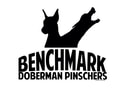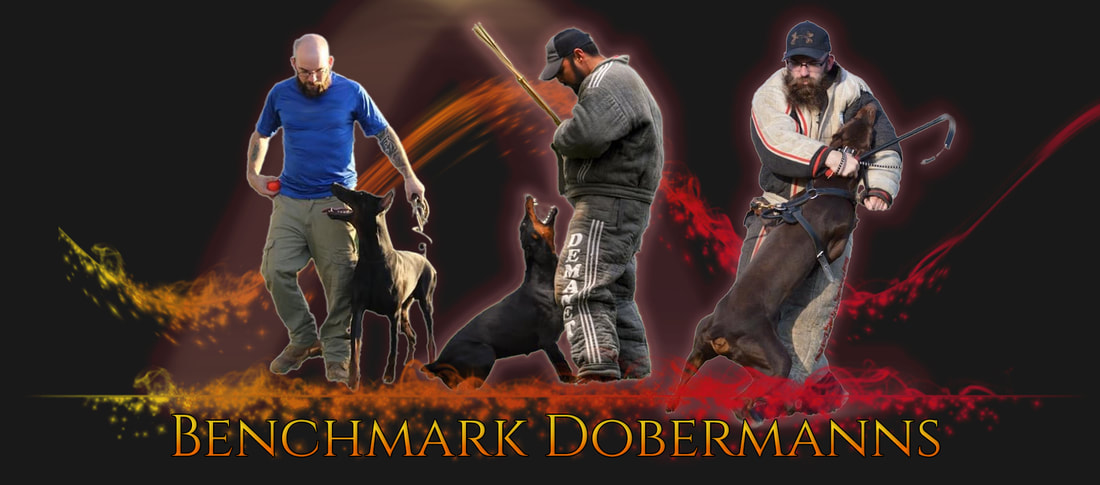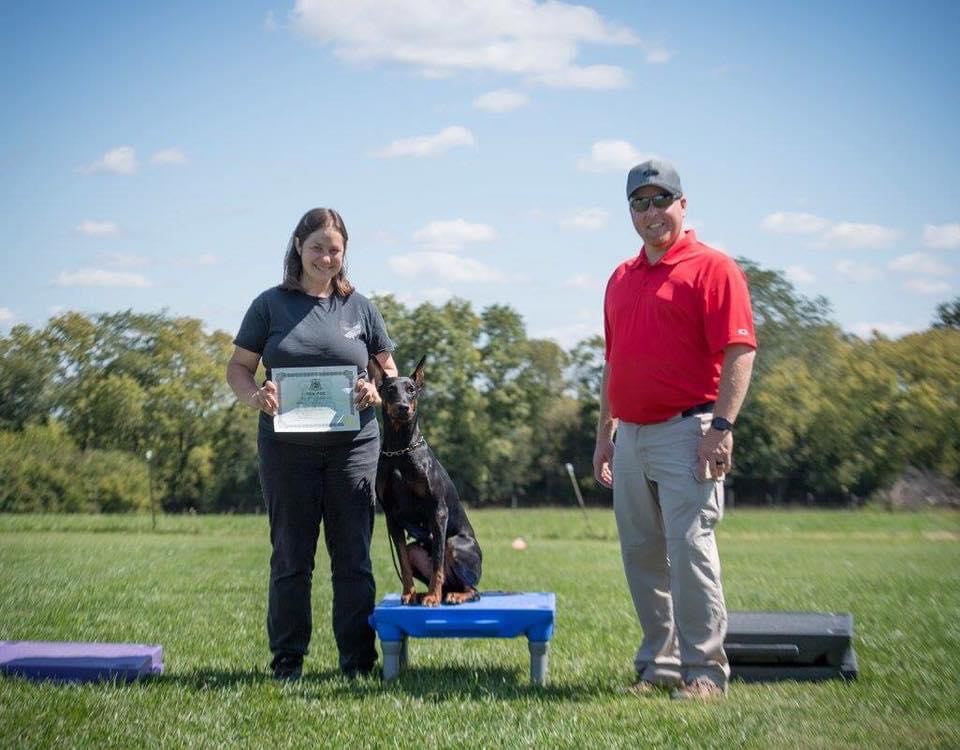About Us
Benchmark Dobermanns was created with the vision to improve the Dobermann breed. Our goal is to produce healthier dogs, with improved longevity, and to help reestablish the Dobermann as a powerful, confident and driven working dog. Our dogs are raised, trained, and tested to be able to work in high pressure situations, and we pride ourselves on our dogs' strong nerves and high drive-- elements lacking in many Dobermanns today. All our dogs are heath tested prior to being bred, and the vast majority are titled as well.
Drew Fischesser has experience in multiple protection sports, specializing in PSA, but with varied levels of experience in APPDA, IGP, American Schutzhund, and WDA. He is highly proficient in training effective personal protection dogs for real-world applications, and has played a significant role in the training and certification of law enforcement K9 teams. Excelling in training "off breeds" in protection, Drew has skillfully built and trained a variety of breeds for PPD and protection sports- including Rottweilers, Cane Corsi, Presa Canarios, Dogo Argentinos, Caucasian Ovtcharkas, Dobermanns, Boxers, Border Collies, Cattle Dogs, American Pit Bull Terriers, American Bulldogs, Olde English Bulldogges, and more.
Drew is the primary training decoy/helper for Benchmark Dobermanns, He is largely responsible for our dogs development and imprinting from puppyhood to adult, and has been pivotal in the success of our dogs on the trial field.
Drew is a top tier training decoy/helper, with over a decade of training and trial experience. He was a certified PSA decoy from 2013-2025, and a senior decoy from 2018-2024, has been Regional and National select decoy, he has titled multiple dogs in PSA, including a PDC for his dog Zelda, a PSA1 on his dog Ivan, the first leg of a PSA1 on his dog Trigger, and a PSA2 on his dog Brutus. He and Brutus were only the 2nd Cane Corso team to ever earn a PSA2, and they competed and podiumed at Nationals in 2015 in the level 2. Drew and Brutus competed in the PSA level 3 multiple times before injury forced Brutus' retirement.
Along with his personal dogs, Drew has successfully built and developed a huge variety of client dogs, and was instrumental in their success and ability to title.He has trained several other decoys, many going on to certify as skilled trial decoys.
He specializes in troubleshooting and problem solving training issues, and has in many cases, helped a team to solve training issues no other trainers have been able to resolve, including some of the highest accomplished and most widely respected training decoys and helpers in the country.
Drew is the primary training decoy/helper for Benchmark Dobermanns, He is largely responsible for our dogs development and imprinting from puppyhood to adult, and has been pivotal in the success of our dogs on the trial field.
Drew is a top tier training decoy/helper, with over a decade of training and trial experience. He was a certified PSA decoy from 2013-2025, and a senior decoy from 2018-2024, has been Regional and National select decoy, he has titled multiple dogs in PSA, including a PDC for his dog Zelda, a PSA1 on his dog Ivan, the first leg of a PSA1 on his dog Trigger, and a PSA2 on his dog Brutus. He and Brutus were only the 2nd Cane Corso team to ever earn a PSA2, and they competed and podiumed at Nationals in 2015 in the level 2. Drew and Brutus competed in the PSA level 3 multiple times before injury forced Brutus' retirement.
Along with his personal dogs, Drew has successfully built and developed a huge variety of client dogs, and was instrumental in their success and ability to title.He has trained several other decoys, many going on to certify as skilled trial decoys.
He specializes in troubleshooting and problem solving training issues, and has in many cases, helped a team to solve training issues no other trainers have been able to resolve, including some of the highest accomplished and most widely respected training decoys and helpers in the country.

Savannah Langdon is the founder of Benchmark Dobermanns and has been breeder/owner/handler/trainer or owner/trainer/handler for 5 of her own dogs to PSA titles, as well as titling many other dogs in multiple other venues, earning nearly 100 titles between 2009 and the present in obedience, rally, agility, weight pull, PSA, and more. Savannah has been involved with Dobermans since 2007, and has been training dogs since 2001. Savannah is a member in good standing of the Doberman Pinscher Club of America (DPCA) and the United Doberman Club (UDC).
LEARN MORE
Here at Benchmark Dobermanns, we do things a little differently. We understand that the Dobermann has fallen from a once well-respected and highly sought after working dog, to the laughingstock of the working dog world. Today, the Dobermann as a breed is generally softer, more sensitive, nervier, less sharp and more suitable to pet homes than the Dobermanns from 30-60 years ago. Today, most serious bitesport competitors and Law Enforcement handlers choose a Malinois, a Dutch Shepherd, or a German Shepherd as their partner. Dobermanns are known in working dog circles as nervy and unlikely to stick a grip.
We are working hard to change that! We are working hard to produce stable, healthy dogs with strong nerves, hard grips, high prey drive, balanced aggression, confidence in defense, courageous and powerful. The Dobermann is the only breed of dog created for personal protection, and we are looking to restore them to a place of respect and admiration in working dog circles. Our type of dog isn't for everyone- one of the challenges of trying to breed stronger dogs is that people who want a dog like that, don't often want a Dobermann; and people looking for a Dobermann rarely want a dog like that. Dobe people in general want more of a "fun and sporty" dog, and even some working breeders are breeding more of a "medium" dog, the type that can do IGP, have fun, be social, and produce puppies that aren't likely to be returned for being too much dog. We have been told that no one wants dogs like ours, they're "too much". It's a challenge to find good, honest and ethical people looking for a strong Doberman! Likewise, it is difficult to consistently produce the type of dogs we are looking for, from a breed that has been watered down for generations. Even pairing the best to the best, puppies are, quite frankly, a crapshoot. Some puppies test very well, but don't grow into what we expect. Some puppies don't test great but really come into themselves with maturity and end up far nicer than expected! Some dogs who are themselves only "okay" go on to produce some of the nicest working dogs when bred! And this is NORMAL, expected. No breeder can claim 100% uniformity in every litter, no matter how much they may wish for it. All we can do is our best, learn from experiences, and be honest with ourselves. Some genetic combinations click and produce phenomenally. Some don't, no matter how nice the pedigrees and parents are. Some breedings are just a "flop".
We don't breed dogs for the purpose of selling. We breed first and foremost for ourselves, and to improve the breed- every breeding is carefully considered for how it can improve one or more aspects of our program, and if it's not good enough for us, we don't do the breeding at all. We keep back a puppy that best fits our goals from nearly every litter for our own program; sometimes here in our home, and sometimes placed on co-owns with dedicated and trusted handlers to be used in our program at a later time. Almost every dog we own or co-own has been born right here, or produced by one of our studs with a quality outside female. We have high standards and carefully select the best fit for our goals from each litter. We like high prey drive puppies who are reckless and forward, curious and brave, fast recovery, with low suspicion and that "swagger" that dares anyone to challenge it!
We know that our ideal type of dog isn't for everyone. We aren't in competition with any other breeder, we have a great working relationship with several other working Dobermann breeders and strive to work together with those breeders who have similar goals, to improve the state of the breed. We want to see others succeed, we want to see more Dobermanns titled and recognized for their working abilities. We aren't looking to downplay or disrespect great Dobermans from other owners and breeders on an effort to make our own look better- rather, we want to know about the best Dobes out there, so we can follow them, cheer them on, celebrate their successes and perhaps work together with their owner to bring more great puppies into the world. Most of our breedings are with outside studs who have met or exceeded our standards of what a great working Dobermann should be; rarely do we have in-house breedings. Occasionally we do make exceptions to this rule and use our own fabulous boys!
We are always open to questions, so if you have any please don't hesitate to reach out and ask.
We are working hard to change that! We are working hard to produce stable, healthy dogs with strong nerves, hard grips, high prey drive, balanced aggression, confidence in defense, courageous and powerful. The Dobermann is the only breed of dog created for personal protection, and we are looking to restore them to a place of respect and admiration in working dog circles. Our type of dog isn't for everyone- one of the challenges of trying to breed stronger dogs is that people who want a dog like that, don't often want a Dobermann; and people looking for a Dobermann rarely want a dog like that. Dobe people in general want more of a "fun and sporty" dog, and even some working breeders are breeding more of a "medium" dog, the type that can do IGP, have fun, be social, and produce puppies that aren't likely to be returned for being too much dog. We have been told that no one wants dogs like ours, they're "too much". It's a challenge to find good, honest and ethical people looking for a strong Doberman! Likewise, it is difficult to consistently produce the type of dogs we are looking for, from a breed that has been watered down for generations. Even pairing the best to the best, puppies are, quite frankly, a crapshoot. Some puppies test very well, but don't grow into what we expect. Some puppies don't test great but really come into themselves with maturity and end up far nicer than expected! Some dogs who are themselves only "okay" go on to produce some of the nicest working dogs when bred! And this is NORMAL, expected. No breeder can claim 100% uniformity in every litter, no matter how much they may wish for it. All we can do is our best, learn from experiences, and be honest with ourselves. Some genetic combinations click and produce phenomenally. Some don't, no matter how nice the pedigrees and parents are. Some breedings are just a "flop".
We don't breed dogs for the purpose of selling. We breed first and foremost for ourselves, and to improve the breed- every breeding is carefully considered for how it can improve one or more aspects of our program, and if it's not good enough for us, we don't do the breeding at all. We keep back a puppy that best fits our goals from nearly every litter for our own program; sometimes here in our home, and sometimes placed on co-owns with dedicated and trusted handlers to be used in our program at a later time. Almost every dog we own or co-own has been born right here, or produced by one of our studs with a quality outside female. We have high standards and carefully select the best fit for our goals from each litter. We like high prey drive puppies who are reckless and forward, curious and brave, fast recovery, with low suspicion and that "swagger" that dares anyone to challenge it!
We know that our ideal type of dog isn't for everyone. We aren't in competition with any other breeder, we have a great working relationship with several other working Dobermann breeders and strive to work together with those breeders who have similar goals, to improve the state of the breed. We want to see others succeed, we want to see more Dobermanns titled and recognized for their working abilities. We aren't looking to downplay or disrespect great Dobermans from other owners and breeders on an effort to make our own look better- rather, we want to know about the best Dobes out there, so we can follow them, cheer them on, celebrate their successes and perhaps work together with their owner to bring more great puppies into the world. Most of our breedings are with outside studs who have met or exceeded our standards of what a great working Dobermann should be; rarely do we have in-house breedings. Occasionally we do make exceptions to this rule and use our own fabulous boys!
We are always open to questions, so if you have any please don't hesitate to reach out and ask.
DNA Health and Diversity Testing
We utilize Embark labs to DNA test our puppies! Here is our process:

When we receive the new test kits, we start by labeling each envelope with the ID collar color of the puppy it is intended for. This makes sure we keep track of which kit goes to which puppy, and ensures mistakes aren't made.

Then, we swab each puppy's inner cheeks for 30-60 seconds to collect a DNA sample.

Next, the swab is inserted into it's own tube, packaged into its own clear pouch, and put into its corresponding shipping envelope.

Each shipping envelope only holds one DNA swab, to avoid cross-contamination.

On our page on the Embark website, we create profiles for each puppy. Each DNA kit is activated for that puppy's profile, so we know which results are for which puppy! At first, those profiles are labeled with the puppy's ID collar color, litter letter, and number. J1 Blue is from our J litter (Jarro x Zelda), is 1 of 8, and has a blue collar!

Once the puppy goes home, the results are sent to the new owner, the puppy's profile is changed to reflect their registered name and call name, and if the owner chooses to create their own Embark account, we add them as owner on their puppy's profile!














